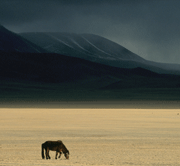E-Archive
Off the Beaten Track
in Vol. 10 - January Issue - Year 2009
Under the Eternal Blue Sky

“Your Highness, my Lord, they have arrived, they’re here!” The messenger pushed his way through the armed guards and threw himself prostrate on the ground before the assembled court, taking in huge gulps of air as he tried to regain his composure for the questions which would inevitably follow. While one of the royal ministers gently quizzed the breathless young man, a hush fell over the throne room as all those present listened intently. No one more intently, however, than the great ruler himself, the man who had been waiting months for the news which he was finally hearing. As soon as the messenger had finished relating details on the visitors’ itinerary and the distance which separated them from the city, the ruler barked several short orders in rapid succession and commanded that a royal escort be sent out to greet his guests and accompany them to the palace. As his officers scurried to carry out his demands, a faint smile briefly appeared on the face of Kublai Khan, the ruler of rulers, the lord of an empire which stretched from the Pacific Ocean to the Mediterranean Sea. He was happy, for he could once again receive the foreigners whom he had so greatly valued during their previous visit years earlier and finally hear more about the peoples and the wonders which lay outside of his vast lands.
*****************
Mongol civilization had reached a level of organization and sophistication unheard of in Europe in the thirteenth century. Much of what we know about that world comes from the detailed descriptions left by the Venetian traveller Marco Polo, who arrived in the summer capital, Shangdu, together with his father and uncle in the late spring of 1275.
Most impressive was the enormous wealth and power of the Yuan dynasty, founded by the Mongols after they had conquered most of China and had extended their empire across the vast plains of Central Asia and into Europe. In fact, the internal economy of the Mongol empire was many times bigger than that of all European kingdoms and countries combined.
The production of iron was at a level not reached in Europe until the eighteenth century, whereas the production of salt in one province alone was greater than that produced along the shores of the entire Mediterranean Sea.
Long before a similar system was developed in Europe, the citizens of the Mongol Empire could count on a fast and reliable postal system which offered two levels of service, equivalent to first class and second class in modern terms, and which ensured delivery of correspondence within a matter of a few days to the farthest corners of the empire. A third, even faster postal service was reserved for official state correspondence and also functioned as a type of news service for the court, bringing rebellions, wars or natural calamities to the immediate attention of the Emperor and his ministers. This structure was based on a series of relay stations spaced about twenty-five miles apart, where each incoming horseman would find a fresh horse to continue his journey and comfortable lodgings in which to rest after entrusting the mail to another horseman, so that the mail pouches would never stop until they reached their final destination.
Another aspect of Mongol civilization which astonished Marco Polo was the existence of paper currency, which circulated freely throughout the empire. This form of payment was imposed by the central authorities, but at the same time it was readily accepted by all citizens as it was convertible to gold or silver and backed by the reserves of precious metals held by the state.
The Mongols had also developed the extraction of coal and its use for heating when very few people in Europe even knew of its existence. Rather amusing is Marco Polo’s account of his first encounter with coal, which he described as “a type of black stone which is extracted in mines and which burns like wood, keeping a flame for much longer than wood. Once it is lit in the evening, it keeps its heat for the whole night. In this land, people burn this stone even though there is plenty of wood.”
Notwithstanding this progress, the rulers never forgot their nomadic origins, for it is said that Kublai Khan had had seeds of steppe grass sown in the courtyard of the Imperial Palace, so that he could always be reminded of the eternal blue sky under which he and his ancestors had roamed.
By Giovanni Gregorat, Contributing Editor MFN
& Sales Manager, Pometon Abrasives
Author: Giovanni Gregorat



























